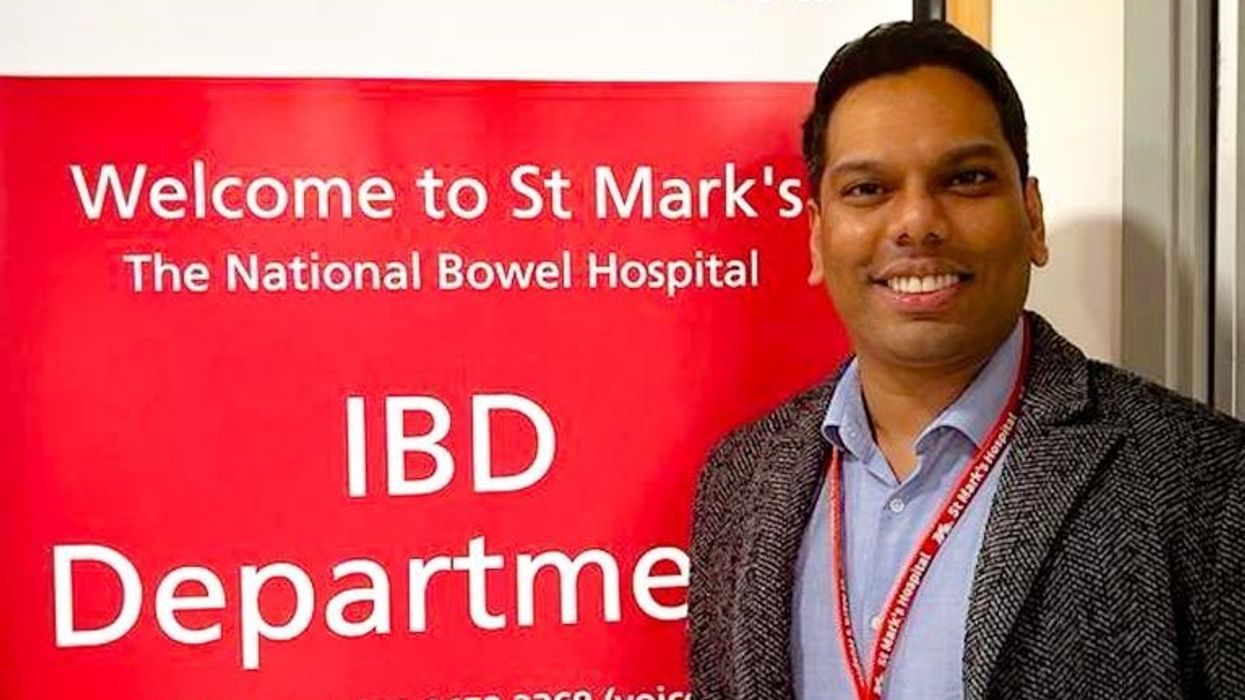Stomach pain, blood in your poo and urgently needing the toilet can be embarrassing, scary and not easy to talk about.
But these are some of the symptoms of Crohn’s Disease and Ulcerative Colitis, the two main forms of Inflammatory Bowel Disease (IBD). Although these conditions stay with you for life, there is treatment and the earlier you are diagnosed, the better. Crohn’s and Colitis can begin at any age, but they usually start before you’re 30.
Dr Lovesh Dyall is an IBD research fellow at St Mark's Specialist Bowel Hospital in London. He says to get the right diagnosis and treatment, it is vital to get thoroughly checked out by a doctor before being referred for further tests. This means a visit to your GP and even if that sounds scary, it is necessary.
“The most important thing is not to shy away from speaking to the GP about these symptoms,” says Dr Dyall. “It is never a waste of the doctor’s time. About 10 per cent of GP consultations are related to bowel symptoms, so this is a significant health issue which needs to be managed appropriately.”
He adds that a late diagnosis means a delay in treatment and that can lead to complications like malnutrition, poor growth (especially for teenagers) and anaemia (fewer red blood cells).
“A diagnosis of Crohn’s or Colitis can be life changing and feel overwhelming, but there is a large team involved in the care of patients. This can include doctors (gastroenterologists), specialist nurses, pharmacists and sometimes surgeons. Crohn’s and Colitis are lifelong conditions, and our aim as doctors is to keep conditions at bay so that our patients can have a good quality of life,” says Dr Dyall.
Crohn’s and Colitis are much more common than people may think. Research carried out by the charity Crohn’s & Colitis UK last year suggests there are more than half a million people living with the conditions. That’s about one in every 123 people in the UK, so the chances are, you know one of them.
December 1st-7th is Crohn’s and Colitis Awareness Week, so it is a great opportunity to learn more about the conditions, know how to spot the symptoms and how to support someone living with Inflammatory Bowel Disease.
If you’re having gut symptoms, you can try the charity’s online symptom checker. In just 30 seconds it can tell you whether or not you should see a GP about your symptoms. It can also send you a personalised letter, including your symptoms, to give to your GP to help start the conversation.
And, since speaking about the symptoms of Crohn’s and Colitis can be difficult, the charity has also created a resource to help people find the right words to talk about their condition to others, including friends and family. The Talking Toolkit, which is free to use on the Crohn’s & Colitis UK website, has loads of tips to help make those awkward chats about Crohn’s and Colitis easier.
Other healthcare professionals are also encouraging people to become more comfortable with their condition and to talk about it more.
Ebenezer Nellikunnil, is a Crohn’s & Colitis UK Nurse Specialist working in Hampshire and sees patients from all walks of life. He understands how hard it can be to be diagnosed with Crohn’s Disease or Ulcerative Colitis.
“The worry of a newly diagnosed patient varies depending on their age. If a child is diagnosed at the age of 10 or 12 they may not be worried, it’s their parents who are worried, so I talk to the parents. When the patients are adolescents, both the patient and the parents are worried. The patients just want to be able to socialise and go to school. With the young adult patients, they are wanting to travel and are thinking about getting a job. For my older patients, they are already established and so they’re more concerned about how it will affect their families,” says Nellikunnil.
Nellikunnil, who trained as a nurse in India and also worked in the Middle East before making his way to the UK, adds that with his patients some are willing to have treatment while others are more hesitant. He believes education about conditions like Crohn’s and Colitis is the key to helping patients better understand what they are dealing with and how to cope with it.
“I really want to tell them that you can have a healthy life even if you have Crohn’s or Colitis, you can still look forward to a quality life and a healthy lifestyle,” says Nellikunnil.
You can find more information about Crohn’s and Colitis Awareness Week here.













